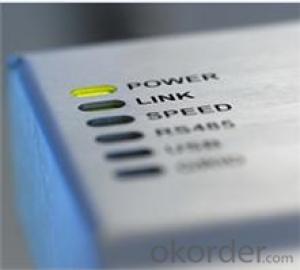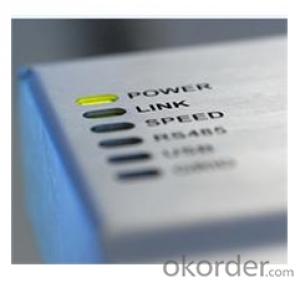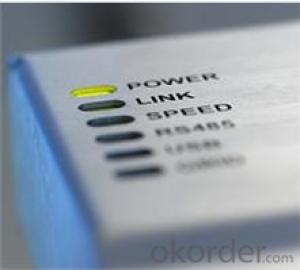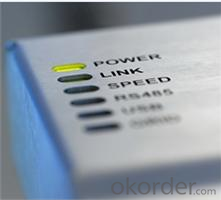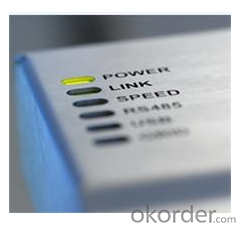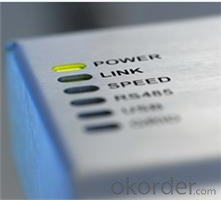Power Solar Inverter EZLogger On-Grid Monitoring Device
- Loading Port:
- Shanghai
- Payment Terms:
- TT OR LC
- Min Order Qty:
- 10 unit
- Supply Capability:
- 100 unit/month
OKorder Service Pledge
OKorder Financial Service
You Might Also Like
Monitoring Device EzLogger
EzLogger can effectively improve the stability and reliability of commercial power station systems with its powerful monitoring, data storage and diagnostic processing. EzLogger features easy operation and powerful functions, deeply favored by our customers. Each EzLogger can support up to 20 inverters in connection while EzExplorer software can monitor 16 EzLoggers at the same time, satisfying large-scale monitoring requirements. It supports long-distance connection with inverters, which is especially convenient for commercial power station management. Its long-term data preservation is suitable for system analyzing and optimization.
| Communication | Inverter communication | RS485 |
| PC communication | 10/100 Mbit Ethernet | |
| Modem | GSM (optional) | |
| Data interface | RJ45 (RS485+Ethernet), RS232, USB2.0 | |
| Maximum Number Supported | RS485/Ethernet/Wireless(EzBee) | 20 units |
| Maximum Communication Distance | RS485[m] | 800 |
| Ethernet[m] | 100 | |
| Wireless(EzBee)[m] | 100 | |
| Power Supply | Power supply | External adapter |
| Input voltage [V] | 100V~240V AC;50/60Hz | |
| Power consumption [W] | <5< td=""> | |
| Environmental Conditions in Operation | Ambient temperature | -20~60℃ |
| Relative humidity(non-condensing) | 5%~95% | |
| Memory | Internal | 128MB in a ring buffer configuration |
| External | Mini SD card 512MB (1G /2G optional) | |
| General Data | Dimensions (WxHxD) [mm] | 150/100/43.5 |
| Weight [kg] | 0.5 | |
| Mounting location | Indoor | |
| Installation options | Wall mounting | |
| Status display | LED indicator | |
| Warranty [years] | 5 | |
| Certificates and approvals | CE |
- Q: Can a solar inverter be used in a ground-mounted solar tracking system?
- Yes, a solar inverter can be used in a ground-mounted solar tracking system. The solar inverter is responsible for converting the direct current (DC) generated by the solar panels into alternating current (AC) that can be used to power electrical devices or be fed back into the grid. Whether the solar panels are fixed or mounted on a tracking system, the inverter's function remains the same.
- Q: What is the role of a grid-tie inverter in a solar PV system?
- The role of a grid-tie inverter in a solar PV system is to convert the direct current (DC) electricity generated by the solar panels into alternating current (AC) electricity that can be used to power electrical devices in a home or business. In a solar PV system, the solar panels produce DC electricity when exposed to sunlight. However, most homes and businesses use AC electricity, which is the standard form of electricity provided by utility companies. This is where the grid-tie inverter comes in. The grid-tie inverter takes the DC electricity produced by the solar panels and converts it into AC electricity that is compatible with the electrical grid. It ensures that the electricity generated by the solar panels is synchronized with the utility power and can be seamlessly integrated into the existing electrical system. One of the key functions of a grid-tie inverter is to match the frequency, voltage, and phase of the AC electricity generated by the solar panels with that of the utility power. This synchronization is crucial to ensure a smooth flow of electricity between the solar system and the grid, and to prevent any disruptions or damage to the electrical system. Additionally, a grid-tie inverter also monitors the electrical grid for safety reasons. It constantly checks the grid for any voltage or frequency fluctuations and can automatically disconnect from the grid in the event of a power outage or grid failure. This feature is important to protect the safety of electrical workers who may be repairing the grid during an outage. Furthermore, a grid-tie inverter allows for net metering, which is a billing arrangement where excess electricity generated by the solar system can be fed back into the grid. This means that if the solar system produces more electricity than is being used, the excess energy can be sent back to the grid and the homeowner or business owner can receive credits for the excess energy produced. This can help offset energy costs and potentially result in monetary savings. Overall, the grid-tie inverter plays a vital role in a solar PV system by converting the DC electricity generated by the solar panels into AC electricity that can be used to power electrical devices, ensuring synchronization with the electrical grid, monitoring the grid for safety, and enabling net metering for potential financial benefits.
- Q: What is the role of a maximum power control feature in a solar inverter?
- The role of a maximum power control feature in a solar inverter is to optimize the energy output of the solar panels by constantly tracking the maximum power point (MPP) of the solar array. This feature adjusts the operating conditions of the inverter to ensure that it operates at the highest possible efficiency, maximizing the energy harvested from the solar panels and improving overall system performance.
- Q: Photovoltaic grid-connected inverter without DC emc how will happen
- light is obtained by the electrons of the semiconductor device, thus generating electrical energy. This energy conversion of light energy into energy, that is, solar cells. Solar cells, like transistors, are made of semiconductors. Its main material is silicon, and there are some other alloys. High-purity silicon used in the manufacture of solar cells is subject to special purification. Solar cells as long as the sun or light exposure,
- Q: What is the importance of overcurrent protection in a solar inverter?
- Several reasons highlight the significance of overcurrent protection in a solar inverter. Firstly, the conversion of direct current (DC) generated by solar panels into alternating current (AC) to power electrical devices is the responsibility of solar inverters. Throughout this conversion process, there is a potential risk of an overcurrent situation occurring, wherein the inverter surpasses its rated capacity. The consequences of such a scenario include overheating, damage to inverter components, and even fire hazards. Secondly, overcurrent protection is crucial for safeguarding the entire solar power system. By promptly detecting and interrupting excessive current flow, it prevents harm to solar panels, the inverter, and other connected electrical equipment. Additionally, it serves as a defense against electrical shocks and other potential hazards that may arise from an overcurrent situation. Furthermore, the maintenance of efficiency and performance in the solar inverter heavily relies on overcurrent protection. When an overcurrent event occurs, the inverter has the capability to shut down or reduce its output, effectively preventing further damage. This proactive approach ensures minimal downtime and guarantees the solar power system continues to function at its optimum capacity. Moreover, meeting regulatory and safety standards is another essential aspect of overcurrent protection. Various countries and regions have specific guidelines and requirements governing the installation and operation of solar power systems. Adhering to these standards is essential to ensure personnel safety, protect the environment, and mitigate any potential legal or financial liabilities. In conclusion, the safety, efficiency, and performance of the entire solar power system heavily rely on the presence of overcurrent protection in a solar inverter. It prevents damage to the inverter and other equipment, safeguards against hazards, and ensures compliance with regulatory standards. Consequently, implementing reliable and effective overcurrent protection mechanisms in solar inverters is imperative.
- Q: Can a solar inverter be used with a ground-mounted solar panel system?
- Yes, a solar inverter can be used with a ground-mounted solar panel system. The solar inverter converts the direct current (DC) generated by the solar panels into alternating current (AC) that can be used to power homes or businesses. Whether the solar panels are mounted on the ground or on a roof, they still require an inverter to convert the electricity into a usable form.
- Q: What is the function of a solar inverter in a solar power system?
- The function of a solar inverter in a solar power system is to convert the direct current (DC) produced by the solar panels into alternating current (AC), which is the type of electricity used in most homes and businesses. This allows the solar energy to be utilized for powering electrical appliances, feeding excess energy back into the grid, or storing it in batteries for later use.
- Q: What is the role of a solar inverter in reactive power control?
- The role of a solar inverter in reactive power control is to regulate and maintain the power factor of the solar power system. It helps in balancing and adjusting the reactive power produced by the solar panels, ensuring that the system operates at an optimal power factor. This control is essential for efficient and stable operation of the solar power system, as it helps to minimize power losses and improves the overall performance of the system.
- Q: Are there any government incentives or rebates available for solar inverters?
- Yes, there are government incentives and rebates available for solar inverters. These incentives and rebates vary by country and region. For example, in the United States, the federal government offers a tax credit called the Investment Tax Credit (ITC) that allows homeowners and businesses to deduct a percentage of the cost of a solar system, including inverters, from their taxes. Additionally, some states and local governments may offer their own incentives or rebates for solar inverters. It is recommended to check with local authorities or consult with a solar installer to determine the specific incentives and rebates available in a particular area.
- Q: How does a solar inverter affect the overall energy consumption of a property?
- A solar inverter affects the overall energy consumption of a property by converting the direct current (DC) electricity produced by solar panels into alternating current (AC) electricity that can be used to power electrical appliances and equipment in the property. It ensures that the electricity generated by the solar panels is compatible with the property's electrical system, reducing the dependence on grid-supplied electricity. By efficiently converting solar energy into usable electricity, a solar inverter helps to lower the property's energy consumption from traditional sources and can potentially result in energy cost savings.
Send your message to us
Power Solar Inverter EZLogger On-Grid Monitoring Device
- Loading Port:
- Shanghai
- Payment Terms:
- TT OR LC
- Min Order Qty:
- 10 unit
- Supply Capability:
- 100 unit/month
OKorder Service Pledge
OKorder Financial Service
Similar products
Hot products
Hot Searches
Related keywords
